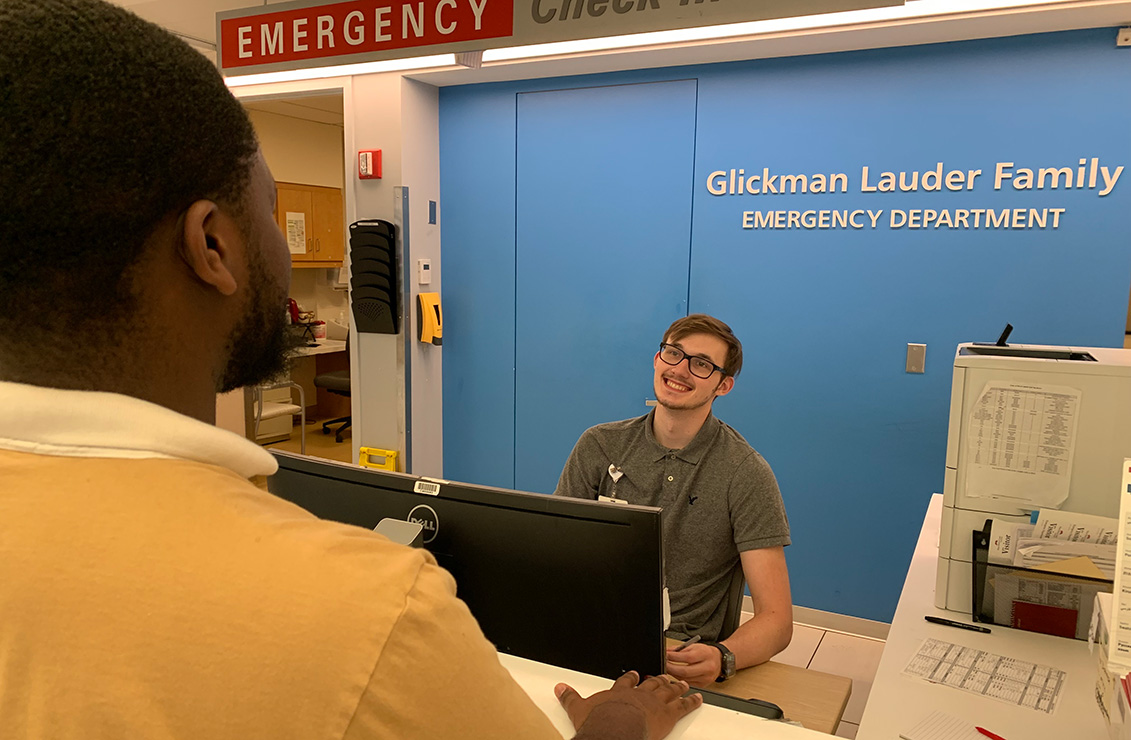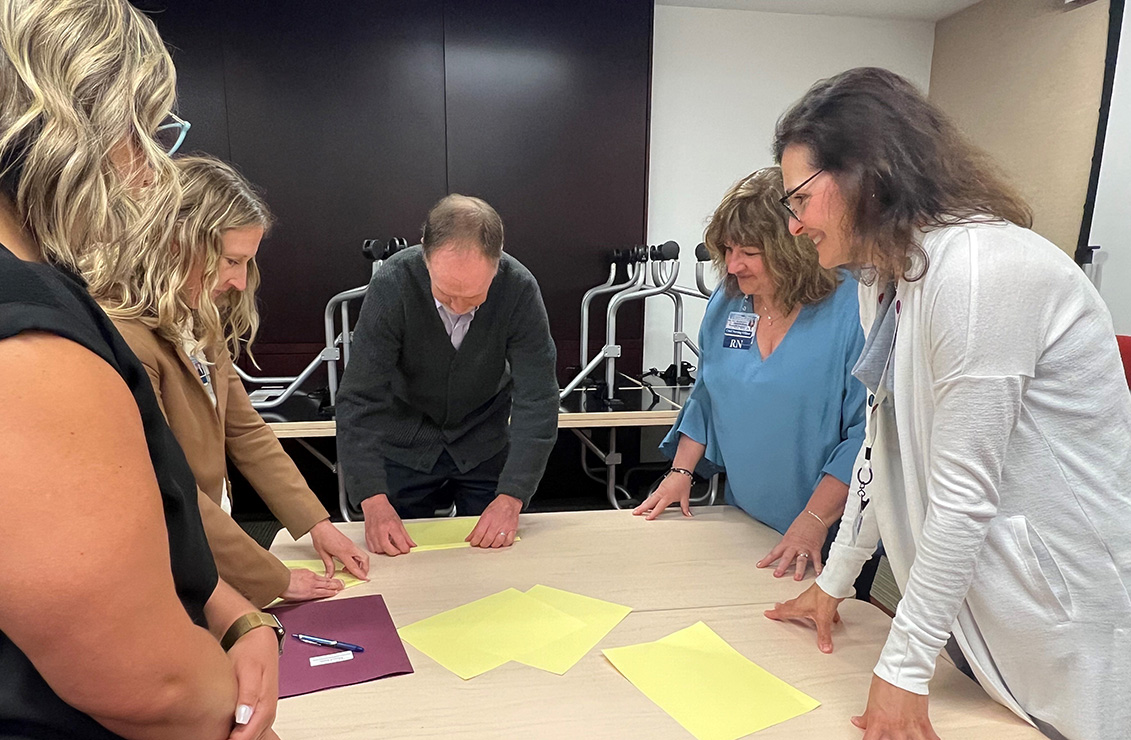Data Collection Lays Groundwork for Health Equity

Ben Johnson, ED Patient Access team member, checks a person in at Maine Medical Center
“When we collect the right information, it’s fascinating what we can discover,” said Ryan Polly, MaineHealth’s Vice President for Diversity, Equity and Inclusion.
MaineHealth’s strategic scorecard goal: Greater than 65% of appropriate patients will be screened for food insecurity, and race, ethnicity and language (REL)
Research has shown that racial and ethnic minorities experience a lower quality of health services than White Americans, and are less likely to receive routine medical care. And when many ethnicities are grouped into one racial category (e.g. Asian), it can mask underlying disparities among subgroups (e.g. Vietnamese, Afghan).
While MaineHealth has already committed to collecting race, ethnicity and language (REL) data from patients (and has exceeded its goal), regulatory agencies are increasingly encouraging hospitals to collect more precise data to identify and reduce health disparities. By proactively adding an ethnic background query process in November 2022, MaineHealth has positioned itself as a leader among health care systems that are revamping their REL data collection efforts.
Providing the Best Care to Every Patient
“Many patients don’t understand why we’re asking these questions, but I have several team members who champion this initiative by explaining why we ask and remaining calm and supportive,” explained Lori Pfaff, Patient Access Pre-Services Manager at MaineHealth. Asking these questions helps us understand who our patients are so we can identify things that may be affecting their health risks and outcomes. MaineHealth is also translating vital documents into the languages most frequently used by our patients to ensure we’re providing patients with materials that they can understand.
MaineHealth will soon begin to collect sexual orientation and gender identity (SOGI) data, a next step toward better understanding our patients so we can provide care specific to their needs.
Striving for Health Equity
This is all part of a larger strategy focused on health care equity. A Health Care Equity Steering Committee was created to monitor progress toward goals, ensure MaineHealth meets regulatory and reporting requirements, and prioritize future initiatives. MaineHealth is committed to examining our health care spaces, processes and policies through an equity lens, continually striving to identify and eliminate health disparities in the communities we serve.

Inclusive Leadership Program Promotes Belonging
Inclusive leaders build and engage diverse teams, creating environments that welcome differences. MaineHealth’s new Inclusive Leadership Program brings together executives to share knowledge and practice inclusive leadership skills. “One of the best parts of the program has been the opportunity to have meaningful conversation in small groups with individuals I do not normally interact with. Hearing different perspectives and people’s stories has allowed me to look at my experiences with a different lens and reflect on my own understanding of what it means to be inclusive,” said Christine Anderson, MSN, NE-BC, Coastal Region Chief Nursing Officer at MaineHealth.
“Collection of REL data ensures that we are providing equitable care to all of our communities. I think about how important the collection of this data was during COVID. With the collection of this data in a patient’s medical record, on a broader level, it was determined that COVID was hitting Black communities differently and more harshly. Then, resources could be allocated to those areas of most need.”
– Lori Pfaff, Patient Access Pre-Services Manager, MaineHealth
2022 – 2026 Strategic Plan
In May 2022, MaineHealth approved a five-year DEI strategic plan with goals in three key areas:
- People
- Patients and Populations
- Value
Learn more about our FY23 – A Year in Review:
- Talent Acquisition: Unconscious bias training has been provided to executive search committees, with inclusive recruiting, interviewing, and onboarding education for all hiring leaders. Additional interviewing and onboarding guides are now available to support the recruitment and hiring process.
- DEI Education: Additional courses and trainings are offered for all care team members on topics ranging from disability inclusion to understanding implicit bias. An inclusive leadership cohort program provides leaders both knowledge and opportunities to practice inclusive leadership skills together with a group of peers.
- Cross-Cultural Humility: Providers across the system completed a cross-cultural medical assessment to identify areas of opportunity for best practice in treatment of different communities, with new courses available to address those areas.
- Policies to Support our Care Team: A Gender Identity and Expression Policy and toolkit was created to help our leaders understand how to support all care team members, but especially those who are trans, non-binary or gender non-conforming.
A policy on Responding to Incidence of Bias or Discrimination by Patients and Visitors in the Workplace was created to help our care team understand what to do when a patient or visitor is discriminatory against a care team member. - Care Team Member Networks: The Black, Indigenous and People of Color (BIPOC) Care Team Member Network (CTMN), LGBTQ+ CTMN, and Leadership Connections CTMN have all started hosting in-person and virtual events for their members. A new Veterans’ CTMN will be launching soon.
- Health Care Equity: A Health Care Equity Steering Committee was created to monitor progress toward goals, ensure we meet regulatory and reporting requirements, and prioritize future initiatives.
- REL/SOGI Data Collection: MaineHealth met its scorecard goal: Greater than 65% of appropriate patients will be screened for food insecurity and Race, Ethnicity, and Language (REL). Planning is now underway for the collection of Sexual Orientation and Gender Identity (SOGI) data.
- System-wide Language Access / Translating Vital Documents: MaineHealth is aligning on language access requirements and procedures. All vital documents are being translated into the top 5 written languages, serving 68% of our non-English speaking patients in clinical settings.
- LGBTQ+ Health: We’re identifying opportunities to improve LGBTQ+ health throughout the system, to better support and meet the needs of this patient population. One example is that legal sex will be removed from patient wristbands.
DEI at Maine Health
MaineHealth is committed to advancing diversity, equity and inclusion (DEI) across our system through focused development of a welcoming, respectful, equitable and inclusive environment. Learn more about DEI at MaineHealth.

